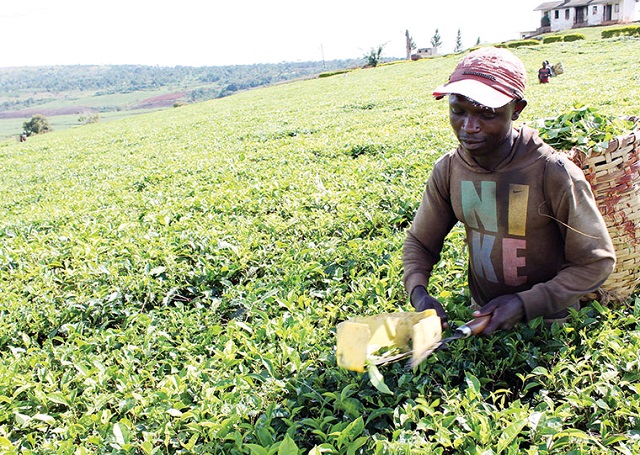
KAMPALA, UGANDA | THE INDEPENDENT | At least three tea estates are currently up for sale, like several others before them, as the sector decline continues.
“Four Square Miles of Tea, Pine Trees, Eucalyptus Trees For Sale In Mityana At 15 Million Shillings Per Acre,” reads an advert for the sale of a tea estate in Mityana District.
Mpanga Growers Tea Factory Ltd, based in Kabarole District, is also looking for buyers for a 155-hectare Kibale Tea Estate located in Isunga, Burahya County, Kabarole District.
In the neighbouring Kyenjojo District, Mabale Growers Tea Factory Ltd has also put up for sale its 25-acre tea estate, including the plantation and factory, located at Kasiina in Kyenjojo Town.
Last year, in the Ankole region, at least nine estates were sold, with some being converted into other uses like livestock farms and wood tree growing.
This is part of the ongoing decline in the tea sector as growers abandon it, citing an increasing fall in returns.
The growers attributed their woes to falling prices, high fertilizer prices and overall operational costs, lack of a government policy, delayed payments, as well as high costs of finance and lack of adequate market.
There was a time when tea was among the three agricultural exports for Uganda, and by 2020, the industry got 89 Million Dollars in foreign earnings, but this has since dropped to 8 Million Dollars a year.
On the local market, farmers are getting 200 shillings a kilo, down from 800 shillings previously, and yet, they pay plantation workers 150 shillings for each kilo of green leaf picked, according to Odrek Rwabwogo, the head of the Presidential Advisory Committee on Exports and Industrial Development (PACEID).
Rwabwogo refuses to acknowledge the growers reasons for the decline in the sector, but blames indiscipline of the farmers and the failure of regulation.
“The main challenge facing the sector is poor quality products, and this is because of the indiscipline of the farmers and the inadequate enforcement of regulations by authorities,” he says.
According to him, what the growers are presenting are the same problems that face other sectors like beef, dairy, coffee, mining and grain, but that the leadership in this sector have a lot to do in terms of ensuring order.
“When you say fertilizer prices, fertilizers help increase productivity. But the challenge is not productivity, it is the market!”
He accuses some farmers of poor harvesting and handling methods, which in turn affect the quality of the product and kill the market.
“One farmer will abide by standards and pick only two leaves per tree, but another farmer will decided to pick up to six leaves because he wants to get bigger volumes from his plantation,” he says, adding, “yet the market will not tell who has harvested quality and who has not, leading to the whole sector to suffer.”
He says these are some of the reasons Uganda’s tea prices on the international market have fallen from 1.19 Dollars to 72 cents per kilogram.
Because of the low returns, production has also dropped from 23 million kilograms in April 2023 to 8 million in August 2024, according to records at the Ministry of Agriculture, Animal Industry and Fisheries.
On his part, President Yoweri Museveni has advised against smallholder tea growing, saying it makes no sense. He recently told the public in Kigezi that because of the high population there, they should leave tea to people who have large chunks of land.
However, Rwabwogo says the government is putting in place interventions to ensure the revival of the sector and reverse the declining market prices.
These include investing in the West African market, especially Ghana and Nigeria, where a trade representative to ECOWAS (Economic Community of West African States), Ani Basset-Eyo, has been appointed to advise the Ugandan government and the sector players on the market procedures and demands there.
Ghana alone is said to consume tea worth 500 Million Dollars a year.
PACEID is also in negotiations with Uganda Airlines to secure promotional freight rates for tea alongside other selected commodities, for at least six months. This would help the tea reach the market at lower costs and earn the country more.
The government is also arranging a financing vehicle that would provide affordable crop financing and capital. Rwabwogo, however, says that this will only benefit growers who are willing to operate in groups like associations, consortia and other self-regulating groups.
It is also in the process of creating a financial company (UGExim) that would be focused on financing for exports.
On the issue of fertilisers, Rwabwogo says they have attracted a manufacturer, Intracom, to establish a factory in Uganda. The idea is to have a partnership under which the company will give Ugandan farmers at least six months’ credit.
In return, the farmers would be committed the supplying the company with raw materials.
This is in addition to the government proposal to introduce fertiliser subsidies to make them affordable for the farmers and enable lower production costs.
****
URN
 The Independent Uganda: You get the Truth we Pay the Price
The Independent Uganda: You get the Truth we Pay the Price



